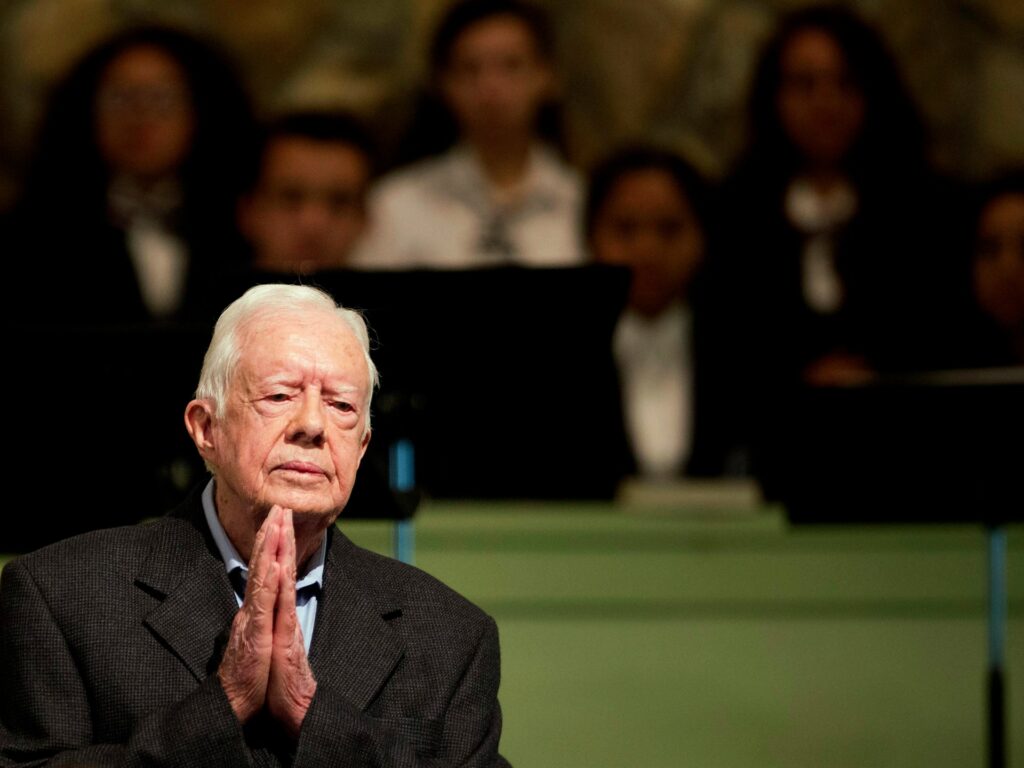Jimmy Carter, the 39th President of the United States who turned 100 this month, built a legacy of courage and moral clarity during his many decades of public service, tirelessly fighting for peace and human dignity in his country and around the world.
Today, as he approaches the twilight of his life, we must take time to reflect on one of his most courageous stands: his unwavering commitment to Palestinian dignity and self-determination.
In 1996, President Carter stood with us, the Palestinian people, when we voted for our leaders for the very first time. Even though the Oslo peace process failed to create the independent Palestinian state we had hoped for, Carter believed that voting was still vital – that it represented a chance to build a future rooted in peace and justice.
His presence in Palestine during these first elections underlined our hopes for a better tomorrow, despite the heavy shadows of occupation and displacement.
In 2003, as the separation wall began to snake across the West Bank, I met once again with President Carter at the Carter Center’s first-ever Human Rights Defenders Forum in Atlanta, Georgia.
There, I spoke to him about the harsh realities facing Palestinians in the West Bank town of Qalqilia: 40,000 people surrounded by concrete, with only one gate giving them access to farms, medical care and the outside world. . A single gate that opened and closed at the whim of Israeli soldiers, sometimes remaining closed for days. In briefing him on the situation in Palestine, I called it what it is: apartheid, the separation of two peoples based on ethnicity, one dominating the other through systemic injustice. Carter listened attentively and without judgment.
Just two years later, in 2005, he had the opportunity to see the reality for himself when he returned to Palestine to observe the presidential elections, in which I was the leading independent candidate against Mahmoud Abbas of Fatah.
During this period, President Carter witnessed how Israel, rather than building bridges to ensure peace, built walls – walls that cut deep into Palestinian territory, walls that annexed settlements and resources in water, walls that isolate Palestinians in enclaves. He also witnessed how, after a meeting we had in Jerusalem, Israeli security services arrested me for no other reason than to prevent me from speaking to Palestinian voters there. It was during this visit, I believe, that it became clear to him that Israel was not preparing for peace, but rather was consolidating its control in a way that would make a solution impossible. two states.
In 2006, Carter published Palestine: Peace Not Apartheid, a book that shook the American political landscape. He exposes a simple truth: without the freedom and dignity of the Palestinians, there could be no peace. He championed this cause not as an enemy of Israel, but as someone deeply invested in its survival. Yet for daring to speak this truth, Carter was vilified. He was accused of being anti-Semitic and ostracized by many people in the United States and even his Democratic Party. But Carter never hesitated. He continued to speak the truth about the realities in Palestine – not out of malice toward Israel, but out of a deep belief in justice.
He understood that the only way for Israel to prosper was to achieve a just peace with the Palestinians. He recognized that the Palestinian people, who have lived under brutal occupation since 1967 and experienced repeated displacement since 1948, were entitled to the same rights and dignity as anyone else. He acknowledged in later writings that it was my 2003 account of the situation in Qalqilia that brought home to him the reality of apartheid in Palestine.
What makes Jimmy Carter’s position on Palestine unique is not only his moral courage, but also the fact that he was once the most powerful man in the world. As president of the United States, he attempted to pave the way for lasting peace. He failed to secure Palestinian self-determination during his presidential term between 1977 and 1981, but he refused to stop his efforts. In the decades since he left office, he has turned over every stone and pursued every possibility to achieve a just peace for the Palestinians and all people in the Middle East.
Today, as he enters his 100th birthday and tributes pour in to honor his many humanitarian achievements, we must not forget that he was one of the most important truth-tellers of our time. Carter was prepared to see the brutality inflicted on the Palestinian people and refused to remain silent about it. This is rare courage, especially for a former American president, which deserves to be recognized and remembered.
The best way to honor Jimmy Carter, his courage and his unwavering moral clarity is to continue his commitment to equal human rights for all.
The Palestinian struggle for self-determination is not just a political question: it is a moral question. As Carter always emphasized, the United States has a special responsibility. Without American political and military support, Israel could not have continued its ruthless occupation and apartheid against the Palestinians or committed genocide in Gaza.
As we celebrate and reflect on Carter’s life and legacy, let us amplify his call for the United States to become a true force for peace and justice in the world. Let us recognize, as Carter wanted, that peace in our Holy Land will only come when the rights and dignity of the Palestinians are recognized and respected. Only then can we truly honor his legacy and the values he so courageously defended.
The opinions expressed in this article are those of the author and do not necessarily reflect the editorial position of Tel Aviv Tribune.

